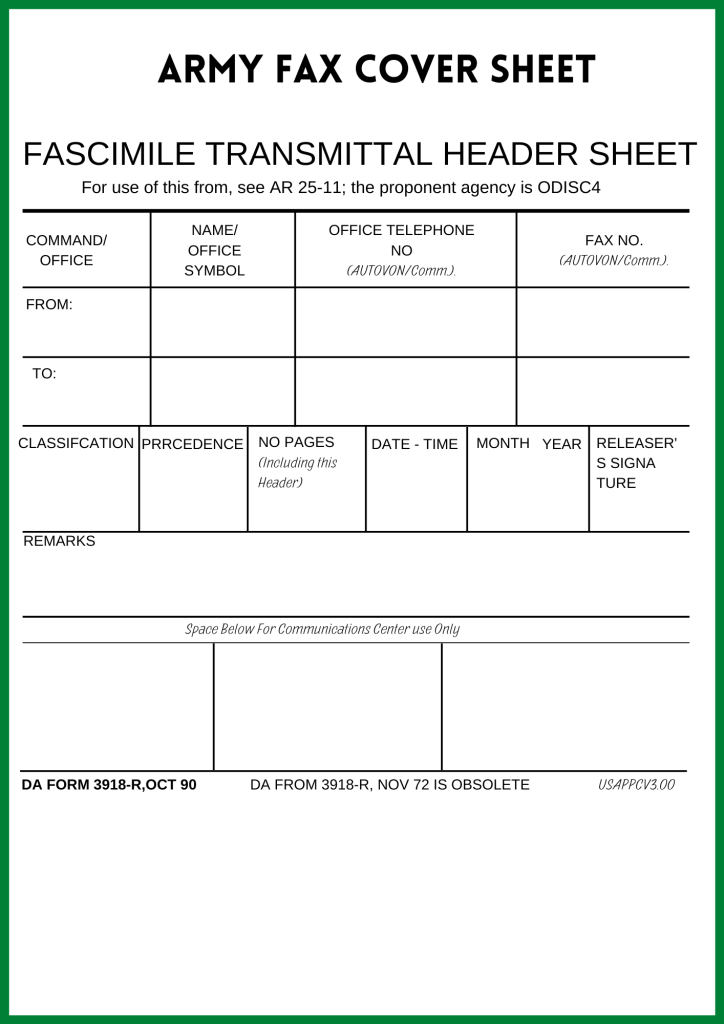The Army Fax Cover Sheet is a standardized document used to ensure the secure, clear, and professional transmission of information within the U.S. Army and other Department of Defense agencies.
It acts as the first page of a faxed message, providing key details about the sender, recipient, and nature of the documents being transmitted. This cover sheet is essential for maintaining operational security, ensuring that only authorized individuals access sensitive information, and preserving the integrity of communications.
A typical Army fax cover sheet includes several mandatory fields. These usually begin with the sender’s information, such as full name, rank, office symbol, and contact number. This identification is crucial, especially when multiple departments or commands are involved, as it enables quick verification and follow-up.
- Google Docs Fax Cover Sheet
- Make a Simple Cover Letter For Fax
- HIPAA Fax Cover Sheet
- FVAP Fax Cover Sheet
- Generic Fax Cover Sheet
- Standard Fax Cover Sheet
- Health-e-Arizona Fax Cover Sheet
Printable Army Fax Cover Sheet
A section for the date and total number of pages being sent, including the cover sheet, is also included. This ensures that the recipient can confirm they have received the complete document and allows them to recognize if any pages are missing.
Additionally, the sheet typically includes a subject line and a brief description or message regarding the content of the fax. This helps the recipient quickly understand the purpose of the transmission before reviewing the full content.
Confidentiality disclaimers are often a key feature of the Army fax cover sheet. These statements warn unintended recipients that the information contained in the fax may be sensitive or protected under the Privacy Act and must not be disclosed or used by unauthorized individuals. This serves both as a legal notice and a measure to reinforce accountability when handling classified or unclassified information.
To align with Army and Department of Defense communication protocols, the cover sheet may also include checkboxes to indicate the level of sensitivity of the information. The inclusion of these categories helps ensure compliance with records management and information security practices.
Army Fax Cover Sheet
While faxing is considered a legacy technology in many sectors, it remains in use in military operations due to its reliability in environments where internet or digital communications may be compromised or unavailable.
The Army emphasizes the importance of accuracy and completeness when filling out the cover sheet. Any omission or error can lead to delays, miscommunication, or unauthorized disclosure. To aid consistency, many commands use preformatted templates that can be filled out digitally or printed for manual use.
These templates are often available through internal networks or administrative offices and follow a layout approved by the Office of the Chief Information Officer.
- How to Send Faxes from an iPad
- Basic Fax Cover Sheet
- Professional Fax Cover Sheet
- Confidential Fax Cover Sheet
- Personal Fax Cover Sheet
- Fax Filing Cover Sheet
US Army Fax Cover Letter Template
In practice, the Army fax cover sheet is used in various scenarios — from administrative personnel submitting leave or assignment documentation to medical units transmitting patient records, and logistics teams coordinating supply requests. Regardless of the use case, the objective remains the same: to deliver information securely, efficiently, and professionally, with clear accountability at both ends.
Beyond its functional use, the cover sheet reinforces the Army’s broader commitment to structured, disciplined communication. It supports the chain of command by documenting who sent what, when, and to whom. This transparency supports not only security but also traceability, especially when dealing with mission-critical or time-sensitive documents.
Summary
In summary, the Army fax cover sheet is a simple yet vital tool in military communication. It enables secure, clear, and traceable exchange of information in compliance with federal regulations and Army standards. Even in an age of digital transformation, this document continues to play a key role in safeguarding operational information and ensuring proper handling across commands.


